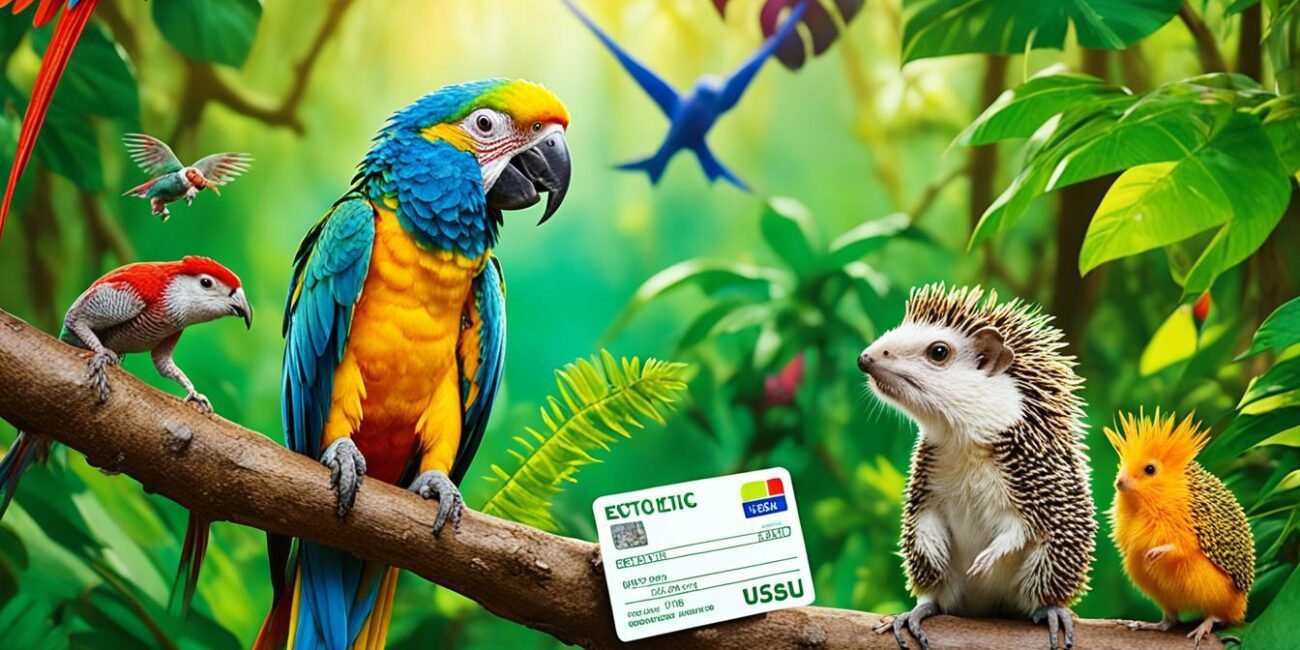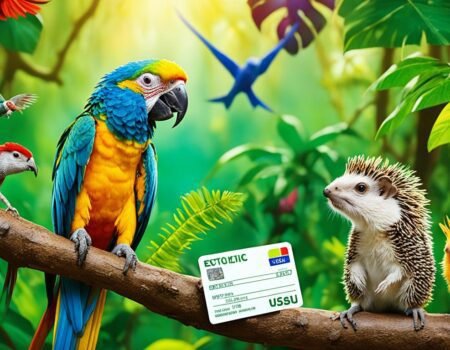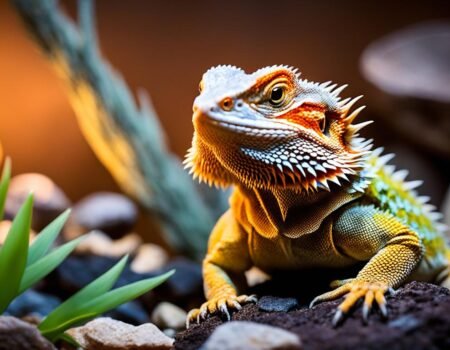Did you know that the number of exotic pets in the US exceeds that of cats and dogs by about 24 million? These unique companions, including birds, fish, rabbits, reptiles, and rodents, require specialized medical care and treatment. As a responsible owner, it’s crucial to ensure their well-being and protect against unexpected veterinary expenses. But finding insurance coverage for exotic pets can be challenging.
Key Takeaways:
- Exotic pets in the US outnumber cats and dogs by about 24 million.
- Exotic pets require specialized medical care.
- Insurance coverage for exotic pets is essential to protect against unexpected veterinary expenses.
- Nationwide is the only insurance company in the US that offers specific coverage for exotic pets.
- Pet Assure and other alternatives provide discounted pet care services for exotic pets.
The Cost of Owning Exotic Pets.
When it comes to owning an exotic pet, the costs can vary greatly depending on the type of pet you choose. Let’s take a closer look at the prices of different exotic pets and the expenses involved.
Bird Prices
If you’re considering a feathered friend, bird prices can range from affordable to quite luxurious. Finches, for example, can be purchased for as little as $10, making them a budget-friendly option. On the other end of the spectrum, rare species like macaws can cost over $5,000 due to their uniqueness and rarity.
Fish Prices
The world of fish can be a captivating one, with a wide range of species to choose from. When it comes to price, small goldfish can be as inexpensive as $2, making them an affordable choice for beginners. However, if you’re looking for something truly extraordinary, rare specimens like plecos and stingrays can cost several thousand dollars.
Rabbit Prices
Rabbits make adorable and affectionate companions. If you’re interested in adopting a rabbit, you have options to fit different budgets. Many pet shops sell rabbits for as little as $10. Alternatively, you can adopt a rabbit from a rescue organization or shelter, which often have lower fees.
Reptile Prices
Reptiles come in various shapes and sizes, each with its own price tag. The cost of reptiles can range widely depending on the species and rarity. For example, a leopard gecko can cost around $30, while a larger and more exotic reptile like a green tree python can reach prices of $1,000 or more.
Rodent Prices
For those considering a smaller companion, rodents can be a delightful choice. The price of rodents can vary depending on the species, but they generally fall within an affordable range. A hamster, for instance, can be purchased for around $10, while a fancy rat may cost around $30.
When deciding to bring an exotic pet into your life, it’s important to consider not just the initial purchase cost but also the ongoing expenses. These expenses can include habitat setup, food, veterinary care, and specialized supplies. It’s worth taking the time to research and budget for the long-term costs associated with owning an exotic pet.
Common Health Conditions in Exotic Pets.
Exotic pets, including birds, fish, rabbits, reptiles, and rodents, are susceptible to a range of health conditions. It is essential for pet owners to be aware of these conditions when considering insurance coverage. Here are some common health conditions specific to each type of exotic pet:
Bird Health Conditions:
- Injuries from flight or attacks
- Viral and bacterial infections
Fish Health Conditions:
- Suppressed immune systems due to poor water quality
- Diseases caused by poor water conditions
Rabbit Health Conditions:
- Gastrointestinal issues
- Respiratory infections
- Dental problems
Reptile Health Conditions:
- Internal parasites
- Bacterial infections
- Respiratory issues
Rodent Health Conditions:
- Internal parasites
- Bacterial infections
- Respiratory issues
Understanding the common health conditions specific to your exotic pet can help you make informed decisions regarding their well-being and insurance coverage.

Nationwide Exotic Pet Insurance.
When it comes to insuring your exotic pet, Nationwide is the go-to provider in the United States. They offer a specialized insurance plan called Avian & Exotic Pet Insurance, which covers a wide range of exotic pets, including those not listed on their website. With Nationwide, you can rest assured that your rare and unique companion will receive the care they need.
One of the key benefits of Nationwide’s Avian & Exotic Pet Insurance is its comprehensive coverage. They provide up to 90% reimbursement on eligible veterinary bills, with a 10% copayment and a per-incident $50 deductible. This allows you to focus on your pet’s wellbeing without worrying about the financial burden of veterinary expenses.
The insurance plan also features a benefit schedule system, which means there are fixed payout limits for each procedure. This ensures transparency and helps you understand the level of coverage you can expect. The maximum payout per incident is $2,000, and there is an annual limit of $7,000. What’s more, there is no lifetime payout limit, so you can continue to receive coverage for as long as your pet needs it.
Waiting Period and Routine Care Coverage
It’s important to note that Nationwide’s Avian & Exotic Pet Insurance has a 14-day waiting period for accidents and illnesses. This means that any veterinary care related to accidents or illnesses that occur within the first 14 days of your policy will not be covered.
Additionally, Nationwide understands that birds require specialized care. They offer routine care coverage as an add-on to their main insurance plan. This coverage includes routine check-ups, vaccinations, and other preventive care measures to keep your avian friend healthy and happy.
| Insurance Provider | Avian & Exotic Pet Coverage | Reimbursement Rates | Insurance Limits |
|---|---|---|---|
| Nationwide | Almost all types of exotic pets | Up to 90% reimbursement | $2,000 per incident, $7,000 per year |
With Nationwide’s Avian & Exotic Pet Insurance, you can provide your exotic pet with the protection they deserve. Their comprehensive coverage, high reimbursement rates, and generous insurance limits ensure that you can focus on giving your rare friend the best care possible.
Pet Assure and Other Alternatives.
If you’re looking for an alternative to traditional pet insurance for your exotic pet, consider Pet Assure. Since 1995, Pet Assure has been providing affordable pet care options for a wide range of animals, including exotic pets. With over 5,600 network locations across all 50 states, Pet Assure offers discounted medical procedures and specialized veterinarian care.
While Pet Assure may not offer the same level of comprehensive coverage as traditional insurance plans, it can significantly reduce the cost of veterinary care for your exotic pet. Whether it’s routine check-ups, diagnostic tests, or emergency treatments, Pet Assure brings you significant savings with exclusive discounts.
Here is an example of the type of discounts Pet Assure offers for exotic pet healthcare:
| Medical Procedure | Discount |
|---|---|
| Annual Check-up | 25% |
| Diagnostic Tests | 15% |
| Emergency Treatments | 20% |
| Specialized Veterinary Care | 30% |
Aside from Pet Assure, there are also other smaller insurance companies, like Prime Insurance, that offer coverage for exotic pets. These alternatives can help offset the cost of veterinary care, allowing you to provide the best possible care for your unique companion.
Remember, when considering an alternative to traditional pet insurance, carefully review the coverage and discount options provided to ensure that they meet your exotic pet’s specific healthcare needs.
Why Choose Pet Assure for Your Exotic Pet?
1. Comprehensive Coverage: Pet Assure covers a wide range of exotic pets, ensuring that you can access discounted care for your unique companion.
2. Savings on Specialized Care: Pet Assure provides discounts on specialized veterinary care, including treatments and procedures tailored for exotic pets.
3. Extensive Network: With over 5,600 network locations, Pet Assure offers convenience and accessibility no matter where you are in the US.
4. Affordable Options: Pet Assure’s discounted rates make it a cost-effective choice for exotic pet owners looking to manage their veterinary expenses.
Take advantage of Pet Assure and similar alternatives to ensure your exotic pet receives the care they need while enjoying valuable discounts on their healthcare expenses.
Considerations for Exotic Pet Insurance.
When deciding whether to get insurance for your exotic pet, there are several important factors to consider. These factors include the lifespan of the pet, the likelihood of common illnesses, the need for specialized veterinary care, and the cost of exotic pet insurance.
Lifespan of Exotic Pets
Exotic pets, just like any other pets, have varying lifespans depending on the species. Some exotic pets, such as birds and reptiles, can live for several decades, while others, like certain rodents and fish, have shorter lifespans. It’s crucial to take the lifespan of your exotic pet into account when considering insurance, as it can impact the length of time you may need coverage.
Common Illnesses in Exotic Pets
Exotic pets are prone to specific health conditions and illnesses that differ from those commonly seen in cats and dogs. For example, birds can develop respiratory infections or feather-plucking behaviors, while reptiles can suffer from metabolic bone disease or respiratory infections. Understanding the common illnesses that affect your specific type of exotic pet is essential in determining the level of coverage you may need.
Veterinary Care for Exotic Pets
Exotic pets often require specialized veterinary care, which can come at a higher cost compared to traditional pets. Not all veterinarians are trained to treat exotic pets, so finding a qualified and experienced exotic pet veterinarian may involve additional travel or expenses. When considering insurance, it’s important to factor in the potential costs of specialized care and the availability of qualified veterinarians in your area.
Cost of Exotic Pet Insurance
The cost of insurance for exotic pets can vary depending on several factors, including the species and age of the pet. On average, exotic pet insurance plans range from $10 to $20 per month. However, the actual cost can vary depending on the coverage limits, deductible, and reimbursement rates offered by different insurance providers. Comparing the cost of insurance against the potential benefits and the specific needs of your exotic pet is crucial in making an informed decision.
| Insurance Provider | Monthly Cost | Coverage Limits | Reimbursement Rate |
|---|---|---|---|
| Nationwide | $15 | $2,000 per incident, $7,000 per year | Up to 90% |
| Pet Assure | $10 | No limits | 25% discount |
| Prime Insurance | $20 | Varies by policy | Varies by policy |
“Insurance coverage for exotic pets can help alleviate some of the financial burden associated with specialized veterinary care and unexpected medical expenses. However, it’s crucial to carefully consider the costs and coverage limitations before making a decision.”
Ultimately, the decision to get insurance for your exotic pet should be based on a thorough evaluation of the pet’s lifespan, potential health risks, the need for specialized veterinary care, and the overall cost of insurance. By considering these factors, you can make an informed decision that best suits the unique needs of your exotic pet and ensures their well-being.
Vet Costs for Exotic Pets.
Veterinary costs for exotic pets can vary depending on the type of pet and the specific health condition they may have. Here’s a breakdown of the estimated vet costs for different types of exotic pets:
Reptiles:
Examination costs for reptiles typically range from $50 to $100. Treatments and procedures can be more expensive, with costs reaching up to $350.
Fish:
Fish may require specialized care, especially when it comes to water quality issues. Treatment costs for fish-related health conditions can be around $200.
Rabbits:
Rabbits need routine check-ups, vaccinations, and dental care to maintain their health. Annual veterinary costs for rabbits are estimated to be between $100 and $125.
Understanding the potential vet costs associated with exotic pets can help you make an informed decision about insurance coverage. While these figures provide a general idea of the costs involved, it’s important to consult with a veterinarian for more accurate estimates based on your specific pet and location.
| Exotic Pet | Exam Costs | Treatment Costs |
|---|---|---|
| Reptiles | $50 – $100 | Up to $350 |
| Fish | N/A | Around $200 |
| Rabbits | N/A | $100 – $125 (annual) |
“It’s important to be aware of the potential vet costs associated with exotic pets so that you can plan for their care accordingly.”
Is Exotic Pet Insurance Worth It?
The decision to get insurance for your exotic pet is a personal one that depends on various factors, including the specific needs of your pet, potential vet costs, and your own preferences and budget. While insurance can provide financial protection and peace of mind, it is important to carefully consider the cost vs. benefits before making a decision.
Exotic pets generally have lower average vet costs compared to cats and dogs, making it less likely to exceed the policy deductible in any given year. This can lead some owners to question the value of exotic pet insurance. However, insurance still offers valuable benefits beyond just covering vet bills.
One significant advantage of exotic pet insurance is the peace of mind it provides. Unexpected accidents, injuries, or illnesses can happen at any time, and the costs can quickly add up. With insurance, you can rest easy knowing that you have financial protection in case of emergencies.
Furthermore, exotic pets often require specialized medical care and treatment. This can come at a higher cost compared to traditional pets. Insurance can help offset these expenses and make it more affordable to provide the necessary care for your rare companion.
Owners who are willing to go to great lengths to save their exotic pets may find insurance to be invaluable. When faced with a significant vet bill, insurance can make the difference between being able to afford life-saving treatment and having to make difficult decisions based on financial constraints.
On the other hand, some owners may be comfortable with occasional high vet bills or accepting the risk of not treating a sick pet. They may choose to forgo insurance and instead rely on their own resources to cover the cost of care.
In summary, the value of exotic pet insurance lies in the peace of mind it provides and the financial protection against unexpected incidents. While lower average vet costs may reduce the likelihood of exceeding the policy deductible, insurance can still offer significant benefits for owners who prioritize the well-being of their exotic pets.
Coverage Limitations and Exclusions.
Just like traditional pet insurance, exotic pet insurance also has its own limitations and exclusions. It’s important to be aware of these factors before making a decision. Here are some key points to consider:
- Waiting periods: Most insurance policies have waiting periods before coverage begins. During this time, any illnesses or injuries that occur may not be covered. It’s essential to understand the waiting period specified in the policy.
- Pre-existing conditions: Exotic pet insurance often does not cover pre-existing conditions. This means that any health issues that your pet had before getting insurance may not be eligible for coverage. It’s crucial to carefully read the policy terms to understand how pre-existing conditions are defined and excluded.
- Chronic conditions: Similar to pre-existing conditions, chronic conditions may also be limited or excluded from coverage. Chronic conditions are ongoing medical conditions that require long-term management and treatment. It’s essential to know how chronic conditions are defined and whether they are covered by the insurance policy.
- Exotic pet exclusions: Insurance companies may exclude coverage for certain exotic pet species, such as venomous animals or endangered species. Hybrids and flocks may also be excluded. These exclusions are in place to manage risk and ensure the sustainability of the insurance coverage.
Understanding the coverage limitations and exclusions specific to exotic pet insurance is crucial to making informed decisions. By carefully reviewing the policy terms and conditions, you can ensure that you choose a plan that suits the needs of your exotic pet.
Exotic Pet Insurance Coverage Limitations
| Limitations | Description |
|---|---|
| Waiting Periods | A specified period during which coverage for illnesses and injuries is not provided. |
| Pre-existing Conditions | Medical conditions that existed before purchasing the insurance policy and are not covered. |
| Chronic Conditions | Ongoing medical conditions that require long-term treatment and may have limited coverage. |
| Exotic Pet Exclusions | Specific exotic pet species, hybrids, or flocks that are not covered by the insurance policy. |
Long-Term Cost Considerations.
When considering the cost of owning an exotic pet, it’s important to factor in the pet’s lifespan and the associated veterinary expenses. Exotic pets typically have shorter lifespans compared to cats and dogs, which can result in lower lifetime costs of ownership. However, it’s crucial to be aware of potential vet costs over your pet’s lifespan and the replacement costs in the unfortunate event of their passing.
Exotic pets require specialized medical care, and veterinary expenses can add up over time. Routine check-ups, vaccinations, and treatments for common illnesses are necessary to ensure the well-being of your unique companion.
Vet Costs Over Pet’s Lifespan
Veterinary costs for exotic pets can vary depending on the type of pet and their specific health needs. It’s important to consider the potential expenses you may incur over your pet’s lifespan. Below is a breakdown of estimated vet costs for different exotic pets:
| Exotic Pet | Estimated Annual Vet Costs |
|---|---|
| Reptiles | $100 – $500 |
| Fish | $50 – $200 |
| Rabbits | $100 – $300 |
Note: These costs are estimates and may vary based on the pet’s specific needs and geographical location.
Replacement Costs for Deceased Pets
If your exotic pet passes away, insurance policies typically do not cover the replacement cost of the pet. This is an important factor to consider when deciding on insurance coverage. While the loss of a pet is emotionally devastating, it’s important to bear in mind that insurance is primarily designed to provide financial protection for veterinary expenses rather than replacement costs.
Understanding the long-term cost considerations, including potential vet costs and the absence of coverage for replacement pets, can help you make an informed decision about insurance coverage for your exotic pet.
Conclusion.
The decision to get insurance for your exotic pet is a personal one that depends on various factors, including the specific needs of your pet, potential vet costs, and your own preferences and budget. While insurance can provide financial protection and peace of mind, it is important to carefully consider the cost and coverage limitations before making a decision.
Exotic pets require specialized medical care and treatment, and the cost of owning them can vary greatly. Vet costs can be significant, especially for procedures and treatments specific to exotic pets. Insurance can help cover these expenses and ensure that your rare and unique companion receives the best possible care.
However, it is crucial to review the coverage limitations and exclusions of insurance policies for exotic pets. Some policies may have waiting periods, exclude coverage for certain species, or not cover pre-existing or chronic conditions. Understanding these limitations will help you make an informed decision about whether insurance is worth it for your exotic pet.
In the end, the goal is to provide the best possible care for your rare and unique companion. Consider your pet’s specific needs, potential vet costs, and your own preferences and budget when making the decision. Whether you choose to get insurance or not, always prioritize the well-being and health of your exotic pet.
FAQ
What is exotic pet insurance?
Exotic pet insurance is a specialized insurance coverage that helps protect your unique companion animals, such as birds, fish, rabbits, reptiles, and rodents, by providing financial assistance for medical care and treatment.
Why do exotic pets need insurance?
Exotic pets are prone to a variety of health conditions and injuries that require specialized veterinary care. Insurance for exotic pets helps ensure their well-being and protects against unexpected veterinary expenses.
Which insurance company offers coverage for exotic pets?
Nationwide is the only insurance company in the US that offers specific coverage for exotic pets through their Avian & Exotic Pet Insurance plan. Other alternatives, such as Pet Assure, also provide discounted pet care services for exotic pets.
What does Nationwide’s Avian & Exotic Pet Insurance cover?
Nationwide’s Avian & Exotic Pet Insurance covers almost all types of exotic pets and provides up to 90% reimbursement on eligible vet bills with a 10% copayment. It has a benefit schedule system with fixed payout limits for each procedure and a maximum annual payout of $7,000.
Are there alternatives to traditional exotic pet insurance?
Yes, Pet Assure is an alternative to traditional pet insurance that offers discounted pet care services for exotic pets. It provides discounts on all medical procedures, including specialized veterinarian care.
How much does exotic pet insurance cost?
The cost of insurance for exotic pets can vary depending on the species and age of the pet, with plans typically ranging from $10 to $20 per month.
What are the common health conditions in exotic pets?
Common health conditions in exotic pets vary depending on the species. Birds are prone to viral and bacterial infections, fish can suffer from poor water quality, rabbits can experience gastrointestinal issues and dental problems, and reptiles and rodents can develop internal parasites and respiratory issues.
Should I get insurance for my exotic pet?
The decision to get insurance for your exotic pet depends on various factors, including the specific needs of your pet, potential vet costs, and your own preferences and budget. Insurance provides peace of mind and financial protection in case of unexpected accidents, injuries, or illnesses.
What are the limitations and exclusions of exotic pet insurance?
Exotic pet insurance policies have waiting periods and do not cover pre-existing or chronic conditions. Certain species, such as venomous or endangered animals, hybrids, and flocks, may also be excluded. It is important to read the policy terms and conditions carefully to understand the coverage limitations and exclusions specific to exotic pets.
How much do vet costs for exotic pets usually amount to?
Vet costs for exotic pets can vary depending on the type of pet and the specific health condition. For example, reptile exam costs range from $50 to $100, while fish may require specialized care for water quality issues, with treatment costs around $200.
What are the long-term cost considerations for exotic pet insurance?
Exotic pets often have shorter lifespans compared to cats and dogs, which means the overall lifetime cost of pet ownership, including veterinary expenses, may be lower. Insurance policies also do not typically cover the replacement cost of a deceased pet.











No Comment! Be the first one.